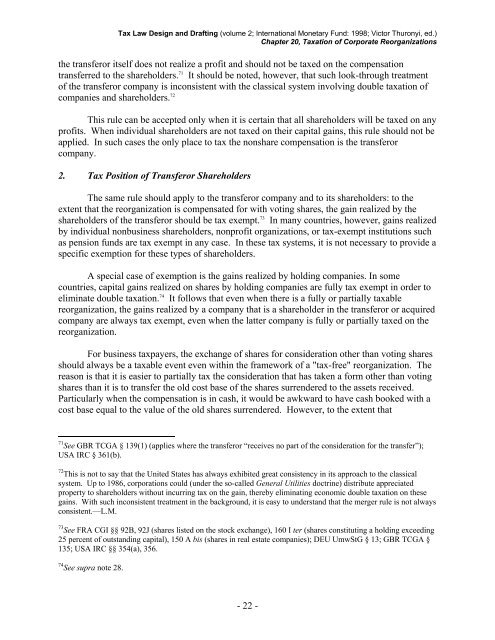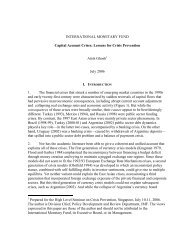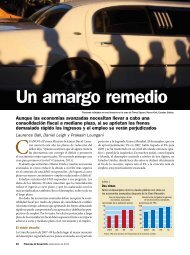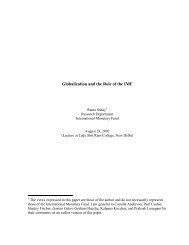Chapter 20: Taxation of Corporate Reorganizations - IMF
Chapter 20: Taxation of Corporate Reorganizations - IMF
Chapter 20: Taxation of Corporate Reorganizations - IMF
You also want an ePaper? Increase the reach of your titles
YUMPU automatically turns print PDFs into web optimized ePapers that Google loves.
Tax Law Design and Drafting (volume 2; International Monetary Fund: 1998; Victor Thuronyi, ed.)<br />
<strong>Chapter</strong> <strong>20</strong>, <strong>Taxation</strong> <strong>of</strong> <strong>Corporate</strong> <strong>Reorganizations</strong><br />
the transferor itself does not realize a pr<strong>of</strong>it and should not be taxed on the compensation<br />
transferred to the shareholders. 71 It should be noted, however, that such look-through treatment<br />
<strong>of</strong> the transferor company is inconsistent with the classical system involving double taxation <strong>of</strong><br />
companies and shareholders. 72<br />
This rule can be accepted only when it is certain that all shareholders will be taxed on any<br />
pr<strong>of</strong>its. When individual shareholders are not taxed on their capital gains, this rule should not be<br />
applied. In such cases the only place to tax the nonshare compensation is the transferor<br />
company.<br />
2. Tax Position <strong>of</strong> Transferor Shareholders<br />
The same rule should apply to the transferor company and to its shareholders: to the<br />
extent that the reorganization is compensated for with voting shares, the gain realized by the<br />
shareholders <strong>of</strong> the transferor should be tax exempt. 73 In many countries, however, gains realized<br />
by individual nonbusiness shareholders, nonpr<strong>of</strong>it organizations, or tax-exempt institutions such<br />
as pension funds are tax exempt in any case. In these tax systems, it is not necessary to provide a<br />
specific exemption for these types <strong>of</strong> shareholders.<br />
A special case <strong>of</strong> exemption is the gains realized by holding companies. In some<br />
countries, capital gains realized on shares by holding companies are fully tax exempt in order to<br />
eliminate double taxation. 74 It follows that even when there is a fully or partially taxable<br />
reorganization, the gains realized by a company that is a shareholder in the transferor or acquired<br />
company are always tax exempt, even when the latter company is fully or partially taxed on the<br />
reorganization.<br />
For business taxpayers, the exchange <strong>of</strong> shares for consideration other than voting shares<br />
should always be a taxable event even within the framework <strong>of</strong> a "tax-free" reorganization. The<br />
reason is that it is easier to partially tax the consideration that has taken a form other than voting<br />
shares than it is to transfer the old cost base <strong>of</strong> the shares surrendered to the assets received.<br />
Particularly when the compensation is in cash, it would be awkward to have cash booked with a<br />
cost base equal to the value <strong>of</strong> the old shares surrendered. However, to the extent that<br />
71 See GBR TCGA § 139(1) (applies where the transferor “receives no part <strong>of</strong> the consideration for the transfer”);<br />
USA IRC § 361(b).<br />
72 This is not to say that the United States has always exhibited great consistency in its approach to the classical<br />
system. Up to 1986, corporations could (under the so-called General Utilities doctrine) distribute appreciated<br />
property to shareholders without incurring tax on the gain, thereby eliminating economic double taxation on these<br />
gains. With such inconsistent treatment in the background, it is easy to understand that the merger rule is not always<br />
consistent.—L.M.<br />
73 See FRA CGI §§ 92B, 92J (shares listed on the stock exchange), 160 I ter (shares constituting a holding exceeding<br />
25 percent <strong>of</strong> outstanding capital), 150 A bis (shares in real estate companies); DEU UmwStG § 13; GBR TCGA §<br />
135; USA IRC §§ 354(a), 356.<br />
74 See supra note 28.<br />
- 22 -
















